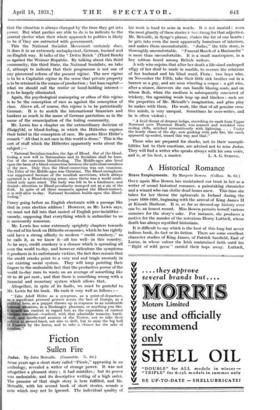Fiction
Sullen Fire
Judas. By John Metcalfe. (Constable. 7s. 6d.) Spun years ago a short story called "Picnic," appearing in an anthology; revealed a writer of strange power. It was not altogether a pleasant story ; it had mistakes ; but its power was undeniable, and its descriptive writing of a high order. The promise of that single story is here fulfilled, and Mr. Metcalfe; with his second book of short stories, sounds a note which may not be ignored. The individual quality of his work is hard to seize in words. It is not morbid : even the most ghastly of these stories is. too strong for that adjective.
Mr. Metcalfe, in Synge's phrase, shakes the fat of our hearts : he gets into even the most apparently humdrum of interiors, and makes them uncomfortable. "Judas," the title story, is thoroughly uncomfortable. "Funeral March of a Marionette" is more than uncomfortable. It is a small masterpiece, in a key seldom heard among British writers.
A wife who enjoins that after her death a life-sized undraped effigy of her shall be made in marble, to oversee the relations
of her husband and his blind ward, Flora : two boys who, on November .the Fifth, take their little sick brother out in a
barrow as a guy, and are soon wheeling a corpse : a girl who, after a séance, discovers she can handle blazing coals, and on whose flesh, when the medium is subsequently convicted of trickery, the agonizing weals leap up and blacken : such are the properties of Mr: Metcalfe's imagination, and grim play he makes with them. His work, like that of all genuine crea- tive minds, is very unequal. Sometimes he over-writes, and he is often violent :
" A livid throat of deepest indigo, stretching its vault from Upper Norwood over Thornton Heath, was seamed and wrinkled into reeling cliffs, stitched intermittently with lightning.. . . Under the heady chaos of the sky, now gushing with pale fire, the earth appeared up-ended, tossed this way and that."
Those who are prepared for shocks, not to their suscepti- bilities but to their emotions, are advised not to miss Judas.
They will find a writer who speaks always with his own voice,














































 Previous page
Previous page